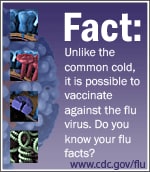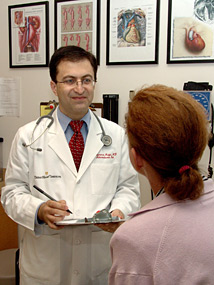Research Shows Flu Can Trigger Heart Attacks
Influenza vaccinations could prevent thousands of deaths from heart disease
People who are at risk of heart disease should receive the influenza vaccine every autumn. Research shows that influenza epidemics are associated with a rise in deaths from heart disease and that flu can actually trigger the heart attacks that result in death.
However, only about 60 percent of people in the U.S. who ought to have a flu vaccination actually have one, said Mohammad Madjid, MD, MSc, a senior research scientist at the Atherosclerosis Research Lab of the Texas Heart Institute.
“Our research has shown that influenza epidemics are associated with a rise in coronary deaths. This calls for more intensive efforts to increase the vaccination rate in people at risk of coronary heart disease. This may be especially important in influenza epidemics when we would expect to see high mortality among the elderly and those suffering from heart problems or who have multiple coronary risk factors,” said Dr. Madjid. “Between 10 and 20 percent of people catch the flu every year, and I have estimated that we can prevent up to 90,000 coronary deaths a year in the U.S. if every high-risk patient received an annual flu vaccination.”
|
Recommendations
- The Am
 erican Heart Association and the American College of Cardiology recommend all patients with heart disease receive the influenza vaccine every year. erican Heart Association and the American College of Cardiology recommend all patients with heart disease receive the influenza vaccine every year.
- The US Centers for Disease Control and Prevention (CDC) recommends everyone 6 months of age and older get a yearly flu vaccine. (www.cdc.gov/flu/)
www.flu.gov
|
Dr. Madjid has previously worked with colleagues in the U.S. and in St. Petersburg in the Russian Federation to investigate deaths between 1993 and 2000 in St. Petersburg that had been shown by autopsy reports to be due to coronary heart disease.
“This was a population where only a small minority received flu vaccines or statin drugs, so this enabled us to see what happened naturally in the absence of these medicines,” said Dr. Madjid. “Relying on autopsy reports rather than death certificates enabled us to be much more accurate about the cause of death, because doctors often neglect to list flu on a death certificate if their patients have died from a heart attack and, conversely, heart attack symptoms can be missed in patients suffering from flu and pneumonia.”
|

Dr. Mohammad Madjid advises patients with heart disease to get flu vaccinations every year.
Listen to radio interview.
|
They found that 11,892 people died from acute myocardial infarction (AMI) (47.8% men and 52.2% women), and 23,000 died from chronic ischemic heart disease (IHD) (40.1% men and 59.9% women). The peaks in deaths from both AMI and IHD coincided with the times when influenza epidemics and acute respiratory disease, which often accompanies flu, were at their height. They found that the chances of dying from AMI increased by a third in epidemic weeks, compared to non-epidemic weeks, and the chances of dying from IHD increased by a tenth. This was the same for both men and women and in different age groups.
Researchers believe that flu causes an acute and severe inflammation in the body which, in some patients, can destabilize atherosclerotic plaques in coronary arteries and cause heart attacks.
Most people in Western countries live with different stages of atherosclerosis and many will never show any symptoms. However, in some patients the stable atherosclerotic plaques undergo sudden changes, mainly due to exaggerated inflammation, leading to rupture of these vulnerable plaques and subsequent formation of clots resulting in heart attacks. Recent studies in Dr. Madjid's lab have shown that influenza infection in mice causes severe inflammation in arteries which is a picture similar to what is usually seen in people dying of heart attacks. Previous studies by THI researchers—and later by other groups—have demonstrated that the influenza vaccine can reduce the risk of heart attacks in high-risk patients. Based on these findings, the American Heart Association and the American College of Cardiology recommend influenza vaccination to all patients with a history of cardiovascular disease, to prevent future heart attacks.
"Our study shows that flu is an important trigger of heart attacks because flu is a severe infection, with high incidence rates and is readily preventable. Therefore, our results give us a new tool for preventing heart attacks,” said Dr. Madjid. “If people can recognize that the flu vaccine has specific cardioprotective effects, then high-risk people will be more likely to make sure that they receive the influenza vaccine every year.”
More recent studies by Drs. Madjid and colleagues have shown that use of antiviral therapy against influenza (Oseltamivir) can further decrease the risk of stroke and heart attacks in susceptible patients after influenza infection. Dr. Madjid advises patients to contact their physicians in the first 48 hours after onset of their influenza symptoms to see if they might benefit from antiviral therapy.
Listen to the interview with Dr. Mohammad Madjid, THI senior research scientist, on Houston's KUHF National Public Radio. (Audio 2:30 min.)
More on other websites
Comprehensive and current information about the flu
www.flu.gov
For health professionals
The Cardiovascular Burden of Influenza
http://media.empr.com/documents/58/mkt26959-1_influenza_comorbidi_14415.pdf
More on this website
Updated August 2016



